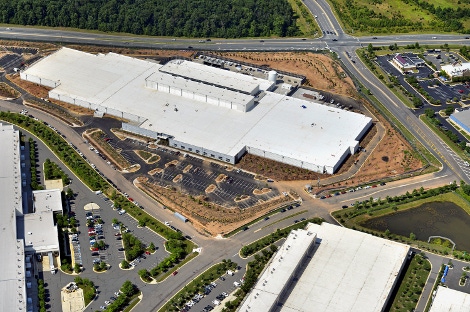Digital Realty Sweetens Facebook’s Ashburn Leases with a Solar Deal
‘Virtual’ Power Purchase Agreement will give Facebook renewable credits from 80MW solar farm in North Carolina.
January 25, 2019

In an unusual arrangement, data center developer Digital Realty Trust has made an energy deal with a solar farm developer on behalf of a single client: Facebook.
Through a “virtual” power purchase agreement, or PPA, Facebook, which leases at least 40MW of data center capacity from Digital Realty in Ashburn, Virginia, will get all Renewable Energy Credits associated with electricity generated by an 80MW solar installation by SunEnergy1 in North Carolina.
Large data center landlords increasingly seek renewable energy to make their facilities more attractive for large corporate customers, whose sustainability goals increasingly influence their data center selection. Digital’s most recent PPA stands out in that the developer signed it for one customer as opposed to its general footprint.
In recent years, hyperscale cloud platforms, including Facebook, Google, and Microsoft, have been expanding data center capacity at unprecedented rates to support rapid business growth. At the same time, they’ve been under pressure to reduce their operations’ impact on the environment, and each of them has set ambitious goals for powering operations with renewable energy.
Data centers consume more electricity than any other part of these companies’ footprint, and powering this already enormous yet rapidly expanding computing muscle with renewables is a moving target. Partly because of the pressure to expand quickly, the companies turn to specialist data center developers like Digital Realty to lease facilities in addition to the data centers they build for themselves.
Making their leased data center footprint carbon-neutral is more complicated than getting renewable PPAs for their own facilities, since they don’t control the buildings and the landlords’ relationships with utilities. But Facebook’s deal with Digital shows that a large-enough client can get a data center provider to help it meet its energy goals.
“Facebook is an important customer of ours,” Aaron Binkley, senior director of sustainability programs at Digital Realty, told Data Center Knowledge in an interview about the PPA.
The 80MW solar farm will match “a portion” of the capacity Facebook leases from Digital in Ashburn, he said, but declined to specify the size of the portion. The PPA’s size “doesn’t directly tie to the megawatts Facebook is using.”
The renewable project in North Carolina will be on the same electrical grid as Facebook’s data centers in Ashburn, and both are in the service territory of Dominion Energy, Binkley said.
Facebook also leases data center space from Digital Realty in Singapore, but it hasn’t publicly shared any information about that site. Asked whether Digital would also seek to procure renewable energy for the social network in Southeast Asia, Binkley said he couldn’t comment on anything other than the Ashburn deal.
Making Facebook’s Leases Stickier
Digital Realty has strong business incentives to put in the effort to procure renewable energy on Facebook’s behalf. It became the social network’s landlord in Ashburn after it acquired data center developer DuPont Fabros Technology in 2017.
In early 2017, before the acquisition, renewing Facebook leases was one of the top priorities for DuPont Fabros’s then CEO Chris Eldgredge. The social network was the developer’s second largest tenant (after Microsoft) contributing north of 20 percent of its annual rent income.
Some of its leases across four Ashburn facilities were up for renewal in 2018, some this year, and some in 2020 and 2021, DuPont Fabros said at the time.
Northern Virginia is ground-zero for the current hyperscale data center expansion, and competition is fierce. Having a renewable PPA in place will make Facebook more likely to stay with Digital as those leases come up for renewal. It will also make Facebook more likely to continue expanding its platform within Digital’s footprint.
A Moving Target
Facebook’s “East Coast Colocation Facility” consumed 359,000MWh of electricity in 2017, according to the company’s most recent sustainability report. Total energy consumption by Facebook’s data center operations that year (consisting of six sites it operated itself and various leased facilities) was 2.36 million megawatt hours. For comparison, all its office buildings consumed 101,000MWh in 2017 – about 4 percent of its data center energy consumption.
Facebook has publicly committed to powering its operations with 100 percent renewable energy and reducing its greenhouse gas footprint by 75 percent by 2020. By the end of 2017, Facebook was running on 51 percent renewable energy, the rest of the mix consisting mostly of coal, natural gas, and nuclear.
As it expands, getting to 100 percent renewable won’t be easy, and cutting its greenhouse gas emissions by three quarters will, too, be an uphill battle. The sustainability report shows a steady rise in the company’s CO2 emissions from 2013 to 2017, its ballooning data center footprint contributing the most. Greenhouse-gas emissions associated with Facebook data center operations went from about 360,000 metric tons in 2013 to about 600,000 in 2017 – a 67 percent increase over four years.
What Makes the Agreement Virtual
A virtual PPA is different from a “physical” PPA in that energy generated under the agreement isn’t physically delivered to the customer. Instead, the energy producer sells it at whatever market rate it can get at any given time, handing the associated Renewable Energy Credits to the customer.
Since the energy price in a PPA is fixed for the duration of the agreement – a typical one lasts 10 to 20 years – the producer and the customer “settle” the difference: if the market rate is lower than the PPA rate, the customer makes the producer whole, and if the market rate is higher, the customer gets credit.
“We’re taking all the environmental benefits from that project and transferring them to Facebook,” Binkley said. He declined to say whether Digital would pass the settlements, up or down, to Facebook.
Read more about:
Meta FacebookAbout the Author(s)
You May Also Like



.jpg?width=700&auto=webp&quality=80&disable=upscale)



